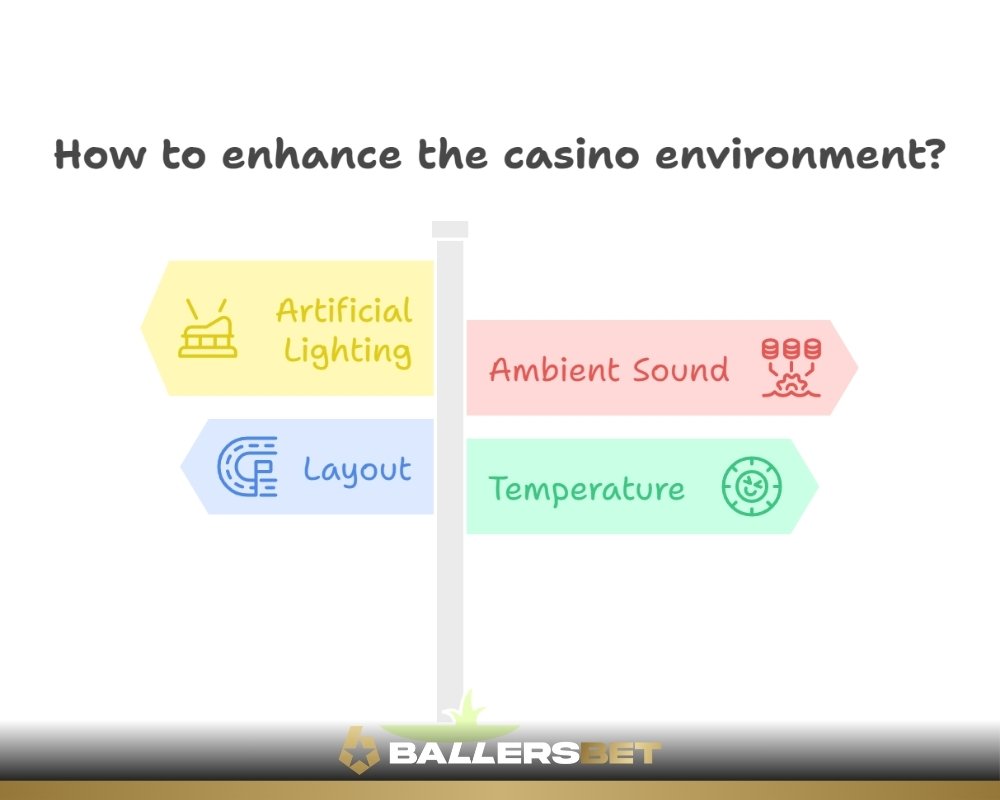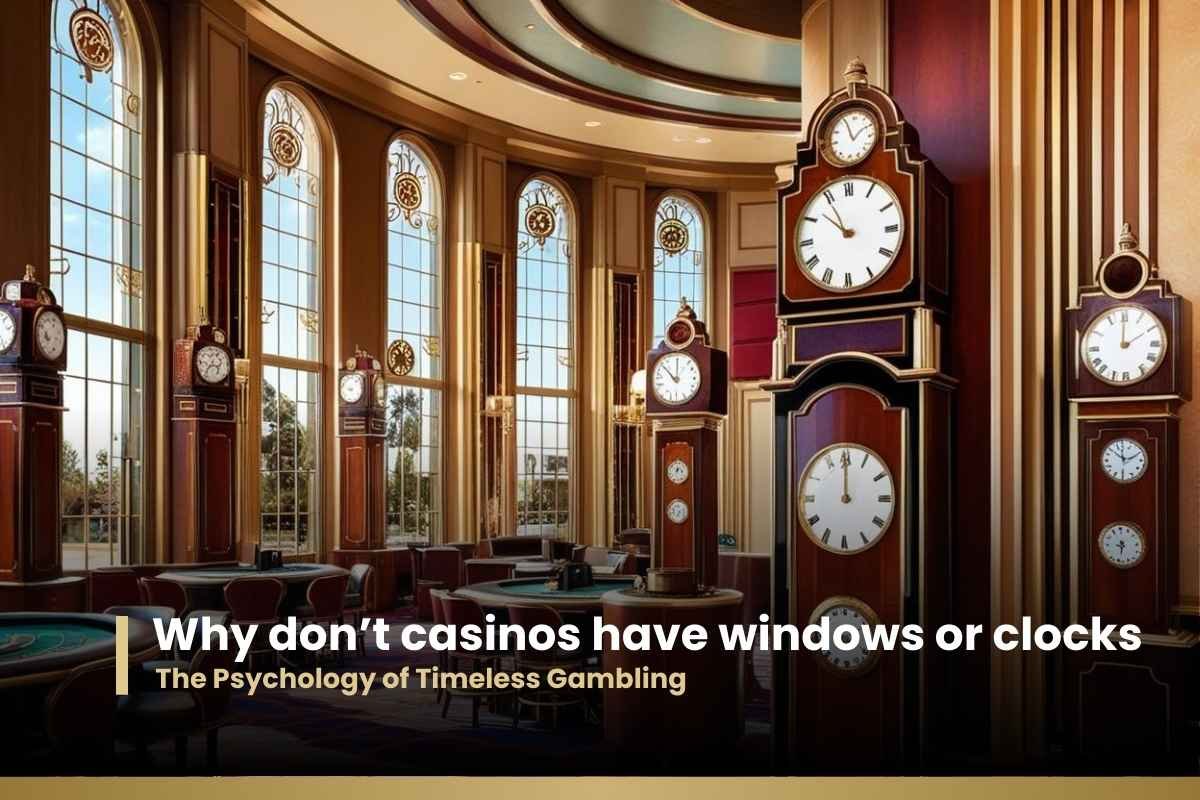Why don’t casinos have windows or clocks? It’s a question many gamblers and first-time visitors ask when they step into a casino and realize they’ve lost all sense of time. The answer is rooted in behavioral psychology and environmental design: casinos intentionally exclude clocks and windows to keep players engaged, disoriented, and immersed in the gaming experience.
This subtle but powerful strategy is part of a broader effort to make guests stay longer, gamble more, and forget about the world outside. In this guide, we’ll break down exactly do casinos have clocks or windows, how this affects behavior, and what it means for players.
Quick Answer: Why Casinos Don’t Have Clocks or Windows?
Casinos don’t have clocks or windows to create a timeless environment that encourages players to lose track of time, stay longer, and spend more. This method leverages a psychological effect known as temporal distortion, where a person’s perception of time is altered due to the absence of natural light and time cues.
What Is Temporal Distortion and How Do Casinos Use It?
Temporal distortion is a psychological state where individuals lose track of time, often because of environmental factors. Casinos use this concept by removing clocks and windows to block all visual indicators of day or night. Without cues like sunlight or ticking clocks, players may sit at a table or slot machine for hours without realizing it.
This manipulation of time perception keeps guests engaged longer, which increases the chances they’ll spend more money.
How Casino Design Enhances the Effect

Casinos are meticulously engineered to control how players feel and behave. Removing clocks and windows is just one part of a larger environmental control strategy that includes:
- Artificial lighting: Simulates perpetual twilight to make the space feel cozy and relaxing.
- Ambient sound: Encourages excitement with the sounds of jackpots, music, and slot machines.
- Layout: Maze-like floor designs make it difficult to find exits or outside cues.
- Temperature: Comfortable climates keep people inside longer without fatigue.
Together, these elements immerse guests in a world where time and urgency vanish.
👉Read More: Can You Record in a Casino?
Why Time Cues Reduce Gambling
Time awareness is a natural motivator for leaving a place or stopping an activity. When you see the sun setting or a clock hitting midnight, your brain registers that it’s time to stop or move on.
By removing these cues, casinos eliminate the common mental triggers that tell people to take a break or leave. The absence of time markers:
- Reduces self-control and decision-making boundaries
- Increases “just one more game” thinking
- Minimizes distractions that might end a gambling session
This leads to longer sessions and higher house profits.
Practical and Technical Reasons
While psychology is the main driver, some casino operators also cite practical reasons for eliminating windows and clocks:
- Sunlight glare: Natural light can create glare on cards, chips, and slot screens, which affects gameplay.
- Climate control: Sealing off external windows helps maintain a consistent internal temperature and lighting ambiance.
- Security and layout: Clock-free, windowless designs simplify surveillance and limit external distractions.
However, these reasons complement—rather than contradict—the primary psychological goals.
Are Players Aware of This Tactic?
Yes, many experienced gamblers know this trick. But awareness doesn’t necessarily negate its effect. Even when people know the casino is trying to manipulate their behavior, the immersive environment often works subconsciously.
Plus, not all players enter a casino with a strict time plan. Without visible time cues, it’s easy to “just keep playing”—especially when drinks are free and the atmosphere feels alive and thrilling.
Are There Casinos with Clocks or Windows?
While traditional casinos avoid clocks and windows on the main gaming floor, some modern casinos—especially those part of resorts or in highly regulated markets—do include:
- Digital clocks in hallways or restrooms
- Natural-light lounges or non-gaming areas
- Hotel and spa windows for guest relaxation
However, these elements are carefully placed away from the gaming areas, ensuring the psychological strategy remains effective.
Is the Design Manipulative or Harmful?
Critics argue that removing windows and clocks is a manipulative practice aimed at encouraging problem gambling. While it’s true that this tactic influences behavior, casinos claim it’s no different from how malls use music and layout to increase browsing and sales.
That said, many jurisdictions now require casinos to include responsible gambling messages, self-exclusion options, and access to time through mobile apps or wristbands.
Could This Change in the Future?
Possibly. With the rise of digital wearables, casino mobile apps, and a growing emphasis on ethical design, we might see more transparency in casino architecture.
Some casinos may opt for “honest immersion,” blending entertainment with player wellness, but until then, the timeless model remains a staple in casino design.
FAQs: Why don’t casinos have windows or clocks
Let’s address some of the most common questions.
1. Do all casinos follow this design?
Most traditional casinos do. However, modern resorts may include natural light in non-gaming spaces like lounges or hotel rooms.
2. why are there no clocks in casinos?
Casinos avoid having clocks to make players lose track of time, encouraging them to stay longer and continue gambling. It’s a psychological tactic to keep the focus on gaming, not the passage of time.
3. Can players still know the time?
Absolutely. Guests can check their phones, smartwatches, or ask staff. Some casinos even offer time reminders via mobile apps.
4. Are windows completely banned in casinos?
Not at all. They’re just avoided in gaming areas to preserve immersion. Windows are common in hotel rooms, restaurants, and spas within casino resorts.
5. Does losing track of time really affect gambling?
Yes. Studies show that when players lose time awareness, they tend to play longer and spend more, often without realizing it.
6. Are casinos trying to trick players?
Casinos are businesses that use psychological principles to encourage engagement. While the design is intentional, most players enter knowing what to expect.
Final Thoughts
The decision to remove clocks and windows in casinos is a powerful example of how architecture, psychology, and business strategy converge. Whether you view it as clever or manipulative, the effect is undeniable: it works.
By designing a space that blurs the boundaries of time, casinos create a world that feels disconnected from reality—one where players stay longer, bet more, and return again and again.
If you’re planning a casino visit, remember: there may not be a clock on the wall—but your time is still ticking.
Note: Ballersbet is a betting platform for users 18+. Betting carries financial risk, so please gamble responsibly and make informed choices.

I’m a Michele, Casino Analyst and Reviewer at Ballersbet.com, where I specialize in providing honest insights and expert reviews of the latest casino games and platforms. With a passion for online gaming and a commitment to transparency, I strive to help players make informed decisions in the ever-evolving world of online casinos.






